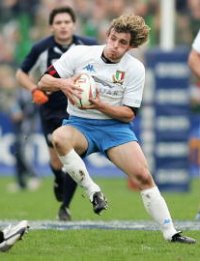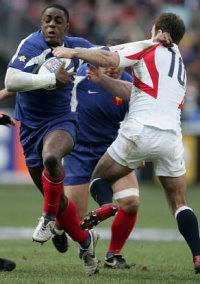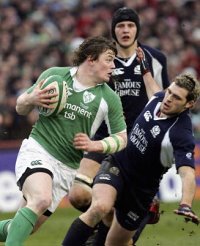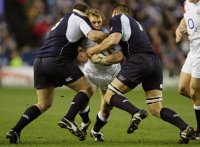Horgan's last-second try snatches a thriller for Ireland at Twickenham
Ireland took the inaugural Triple Crown trophy with a epic 28-24 Six Nations victory over England on Saturday, sealed with try by wing Shane Horgan two minutes from time.

In a thrilling match the lead changed hands four times before the video referee ruled Horgan's late stretch for the line in-goal and not in touch. Andy Goode's flawless second-half kicking display looked to have stolen the spoils for the home team when he landed his fourth penalty to make it 24-21 with seven minutes to go, but it was not to be.
England finish fourth, with a host of questions unanswered and a number of heads likely to be on the Twickenham chopping block in the coming weeks. Ireland appear to have emerged from their November slump, and are building well ahead of the looming 2007 Rugby World Cup.
It was a fitting finale to this tournament. Not perfect in terms of pure quality, but with a competitive edge, and ebb and flow of momentum, that kept all observers in thrall right up until the final twists in the tale.
It also contained a bitter aftertaste of officiating controversy for England, who will be judged on the criminal virtues of international defeat but will point in shallow mitigation at the television replay which clearly showed Shane Horgan's first try to be invalid, the ball scuffing the touchline before Horgan hacked ahead into the in-goal area.
Then there is the replay which showed Ben Cohen's quick line-out to be valid in the 58th minute. The touch-judge ruled it invalid, and England were forced to throw again. From that line-out, Denis Leamy pounced for Ireland's second try.
That mitigation will be shallow indeed though, for the English had many chances to kill the game off, and were helped to no small extent by referee Nigel Whitehouse, whose exemplary policing of the breakdown ensured all ball that should have been quick was quick. England frequently had the platform from which to do their stuff. All too frequently they stuffed it up, either figuratively by making mistakes, or literally, up their shirts when men were free.
In the cold light of day, there will be plusses for England to look at. The team was unquestionably a hundred per cent better than the limp lot that folded like so many crêpes last week in Paris.
The scrum was formidable, and harried five penalties out of the Irish scrum. The forwards, in the second half especially, built up heads of steam and sequences of possession that would have yielded tries in most games.
Mike Tindall ran with purpose and speed, as did Stuart Abbott, who made several threatening thrusts. Lee Mears translated flashes of his club form up to the higher level on his first Six Nations start, and Andy Sheridan's work-rate was noticeably higher than it had previously been.
Ireland's hour of glory -- fittingly on St. Patrick's Day weekend -- is richly deserved, irrespective of the slices of fortune they feasted upon. Their game, which unravelled completely for fifty minutes in Paris, has come fully together again.
In the first half especially, the defenders attached themselves to every English runner like iron lumps to a magnet. They won eight penalties in that first half, and turned over the ball five times in open play. The open stuff was not so impressive in the second half, but the form of attack had changed: England lost well over half of their line-outs in the second half, including the one that led to Leamy's try.
In attack, Geordan Murphy gave a sublime display of running lines and adventure, while Shane Horgan underpinned it with the work-rate of an industrial motor. Up front, the loose trio of David Wallace, Simon Easterby and Denis Leamy was magnificent. Only in the front row was there a weakness to be found, but hooker Jerry Flannery in particular made up for that in the loose.
It all started so brightly for the home team. Paul O'Connell missed the kick-off, and the ball bounced loose. A scrum ensued at which the Irish front row was penalised for binding issues. Harry Ellis tapped and spun the ball wide, and Jamie Noon bulldozed his opposite number for the opening score after 74 seconds.
Goode missed that conversion, and missed two other kicks in the half as he struggled to find his rhythm. By the time he had missed his second, England were 8-5 behind, courtesy of an O'Gara penalty and the first Horgan try, which will have English fans fuming tomorrow.
O'Gara kicked from open play and the ball went towards Ben Cohen. Whatever Cohen's intentions were, they did not include catching the ball, and he let the ball bounce past him before springing into action and slipping on the loose turf. Horgan skipped past him and hacked the ball ahead. Touch-judge Rob Dickson's flag shot up to head height, and then ducked back down behind his back just as quickly, as Horgan dived on the loose ball for the try. Television replays clearly showed the ball touching the line. But then, if Cohen had done something, anything, in fact, beyond standing as though petrified, Horgan could never have even got to the ball. Who is really to blame?
Cohen had a miserable first half, and it is to his credit that he later turned things around. On 25 minutes, with Ireland now 8-5 ahead, he scrambled to secure another regulation high ball, and then hoisted an extraordinary kick into space where only Irish runners were lurking. Ireland forced two penalties as a result, and should have taken three points. Instead they went for a tap, and England turned over and cleared.
Ireland did make it 11-5 on 32 minutes, for a trip on Stringer by Simon Shaw, who was sin-binned for his efforts. From the restart, Simon Easterby obstructed the chasers, and Goode made it 11-8.
Ireland had two more clear chances to extend the lead before the break, first Gordon D'Arcy over-ran Brian O'Driscoll on the overlap, and then Flannery popped up in the line outside O'Driscoll with the speed of a greyhound but the co-ordination of a baby Llama. 11-8 it stayed until the break.
Goode and O'Gara swapped two further penalties in the opening two minutes of the second half, but now was England's best period. Between minutes 45 and 53 they laid siege to Ireland's 22, using a mixture of their wrecking-ball forward running and the crowbar-like openings created by Abbott, Cohen and Tom Voyce. Eventually Steve Borthwick popped up on a Tindall-like angle and broke through to go under the posts, making it 18-14.
Whatever England gained by hammering away, Ireland clawed back through the line-outs. While England dominated the third quarter, they lost every single line-out bar one. From one, David Wallace broke to make some 50m before England turned over and cleared to touch.
Ireland were then gifted the lead back. The maligned Cohen chased back an O'Gara kick, which bounced into touch five metres from the England line. Cohen took the ball, and took a quick line-out to himself, but the touch-judge ruled he had stepped onto the pitch, television replays once again showing otherwise. The throw was ordered again. Nobody jumped for Mears's throw though, an unforgivable error, and Leamy took the ball at the back and sprung over the line, with O'Gara making it 21-18.
Still England bashed and bashed, but Ireland closed up superbly, and once again England's reluctance to look outside proved costly on a couple of occasions -- not least when Lewis Moody had Mark Cueto screaming for the ball outside him, yet chose to run diagonally until all Cueto's space had been eaten up before giving Cueto the ball. Horgan put Cueto ineffectually into touch, and O'Gara cleared from the line-out.
But a high tackle on Goode by Easterby -- for which he was sin-binned -- and an errant Irish hand at a ruck gave Goode two penalties to slot, and England led 24-21 with six minutes to go. The doors of the jail were open.
Then they were slammed firmly shut again by a piece of magic. O'Gara's chip bounced away from Cohen -- who was more unlucky than culpable this time -- and O'Driscoll took the ball at pace. He timed his pass to Horgan superbly, but Horgan was tackled 7m short of the line magnificently by Moody. Ireland ran the ball inside for two phases, before O'Driscoll once again found Horgan with Moody breathing down his neck. Same pair, same corner, same situation, but this time the Irishman stretched out an arm and plonked the ball on the line like an empirical flag on new-found territory.
O'Gara converted, and officials began tying green ribbons on that sparkly new Triple Crown trophy.
Man of the match: For England, Andy Goode and Martin Corry stood out for distribution and work-rate respectively, and Lee Mears added extra dimenisons to hooker play. For Ireland, Shane Horgan was superb with the ball in hand, as was Geordan Murphy. the loose trio were instrumental in frustrating england at key moments. Those five are all tied for the runner-up spot, but for a spot of work well above the expected level: namely the try-saving tackle on a flying winger with a minute left on the clock, Lewis Moody gets himself a nose in front of the rest and wins our award for man of the match. Referee Nigel Whitehouse should also be mentioned for an excellent performance.
Moment of the match: Would have been the try, but it was ruined by the need for the video referee. So Lewis Moody's try-saving tackle gets the nod.
Villain of the match: Could have been the touch-judges who made the crucial mistakes, but something even more unpleasant happened on the pitch, when Jerry Flannery's hands flew to his face in horror at a playground slap from Matt Dawson. Listen carefully: Rugby -- players -- do -- not -- fake -- injury.
The scorers:
For England:
Tries: Noon, Borthwick
Con: Goode
Pens: Goode 4
For Ireland:
Tries: Horgan 2, Leamy
Con: O'Gara 2
Pens: O'Gara 3
The teams:
England: 15 Tom Voyce, 14 Mark Cueto, 13 Jamie Noon, 12 Stuart Abbott, 11 Ben Cohen, 10 Andy Goode, 9 Harry Ellis, 8 Martin Corry, 7 Lewis Moody, 6 Joe Worsley, 5 Simon Shaw, 4 Steve Borthwick, 3 Julian White, 2 Lee Mears, 1 Andy Sheridan.
Replacements: 16 Steve Thompson, 17 Perry Freshwater, 18 Danny Grewcock, 19 Lawrence Dallaglio, 20 Matt Dawson, 21 Dave Walder, 22 Mike Tindall.
Ireland: 15 Geordan Murphy, 14 Shane Horgan, 13 Brian O'Driscoll (captain), 12 Gordon D'Arcy, 11 Andrew Trimble, 10 Ronan O'Gara, 9 Peter Stringer, 8 Denis Leamy, 7 David Wallace, 6 Simon Easterby, 5 Paul O'Connell, 4 Malcolm O'Kelly, 3 John Hayes, 2 Jerry Flannery, 1 Marcus Horan.
Replacements: 16 Rory Best, 17 Simon Best, 18 Donnacha O'Callaghan, 19 Johnny O'Connor, 20 Eion Reddan, 20 David Humphreys, 21 Girvan Dempsey.
Referee: Nigel Whitehouse (Wales)
Touch judges: Nigel Owens (Wales), Rob Dickson (Scotland)
Television match official: Huw Watkins (Wales)
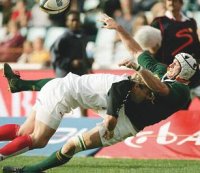

 Bath fly-half Olly Barkley inspired the winning send-off as the world champions prepare to face Australia in Sydney and Melbourne next month.
Bath fly-half Olly Barkley inspired the winning send-off as the world champions prepare to face Australia in Sydney and Melbourne next month.
